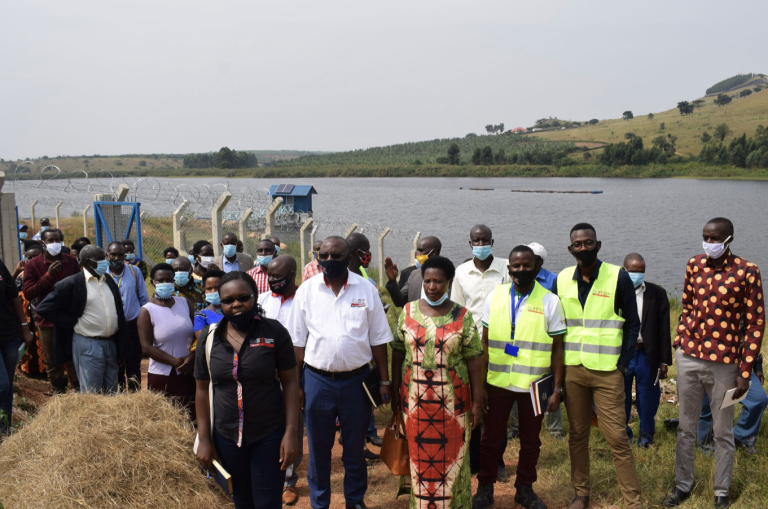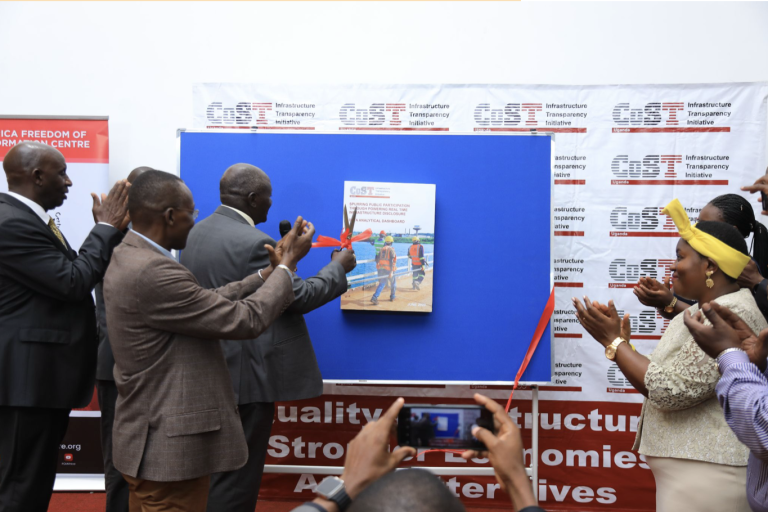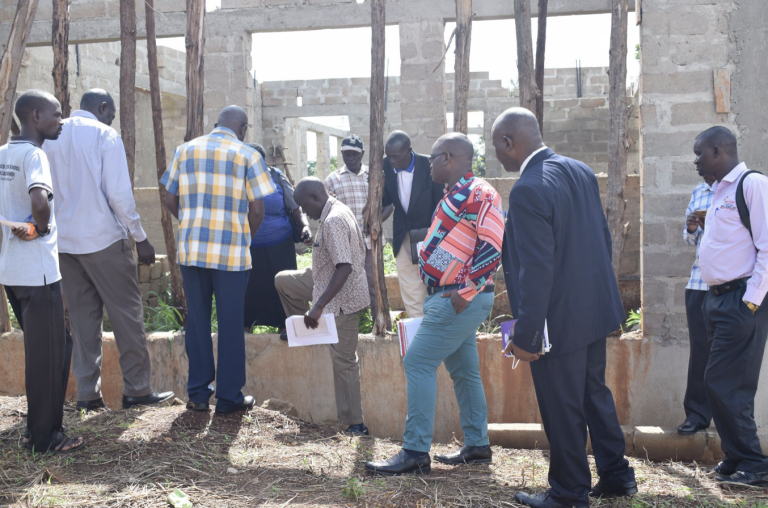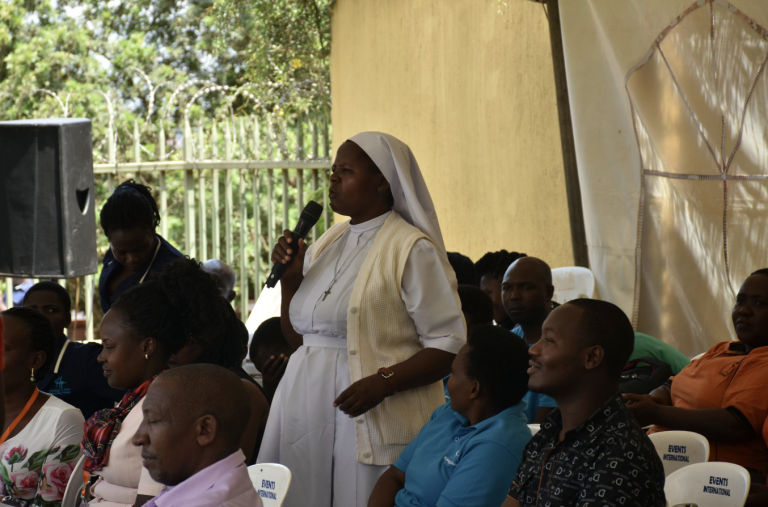Member since 2014
Prior to CoST: Public infrastructure in context
According to a Transparency International survey from 2015, 69% of citizens in Uganda felt that the government does not do enough to fight corruption, and 35% of respondents were afraid of the consequences of reporting corrupt practices.
The legal framework in Uganda provides the legal basis for the right of access to information, which has been entrenched in the 1995 Constitution, emanating from Article 41 of the Constitution, which provides clear procedures that citizens can use to access public information. But having such a provision in the constitution of the land is not in itself enough if not operationalized. The government further enacted the Access to Information Act 2005, an Act to operationalize this provision of the constitution and stimulate citizens’ participation in the development processes, including participation in public procurement processes. In the infrastructure sector specifically, procurement audits carried out in 2014 by the Public Procurement and Disposal of Public Assets Authority (PPDA) found that contracts had been corruptly awarded to pre-determined bidders. 104 cases of corruption were investigated in 2014/2015, and 45 companies were suspended from procurement and disposal procedures because of corrupt and fraudulent practices. To ensure efficiency and effectiveness in public procurement, the government established the Public Procurement and Disposal of Public Assets Authority (PPDA) under the PPDA Act, 2003, in line with the decentralization policy of 1993. The authority is charged with the mandate to regulate public procurement in Uganda.
CoST Uganda: How it all began
The CoST membership application was made by the Uganda National Roads Authority (UNRA) in 2013 and joined in 2014, focusing on a desire to enhance transparency and accountability in the infrastructure sector by adopting CoST’s pillars. The UNRA committed to engaging stakeholders, oversight bodies, and procurement entities with the CoST approach through monitoring, disclosure, and knowledge sharing, but this was only at the subnational level.
Since joining CoST in 2014, Uganda has continually worked to embrace the initiative, showing a strong commitment to its core features of data publication, assurance, social accountability, and multi-stakeholder working. CoST Uganda released its first scoping study in 2017, which was declared to be a ”recipe for change” by the Minister of Works and Transport, Monica Azuba Ntege.
The study captured a baseline measure of transparency in public infrastructure in Uganda. It demonstrated how CoST can be used and adapted to add value to its delivery. It revealed that Uganda has an ‘enabling environment’ for the implementation of CoST, but that there is still work to be done. Issues such as data capacity, a lack of judicial appeal mechanisms, the attitude of public officials, limited civic engagement, and poor information storage systems provide a challenge to implementing reform.
The study recommended that the government adopt a legal mandate for data publication in accordance with the CoST Infrastructure Data Standard. It also recommended increasing access to information for citizens, building the capacity of citizens to use the information, and forging links with other open data initiatives to increase CoST’s impact.
Multi-Stakeholder Working
CoST brings together stakeholder groups with different perspectives and backgrounds from across government, the private sector, and civil society. Through each member’s Multi-Stakeholder Group, these entities can guide the delivery of CoST and pursue infrastructure transparency and accountability within a neutral forum.
Since 2019, CoST Uganda has operated without a functional multi-stakeholder group following a governance review, and efforts to establish a Multi-Stakeholder Group are ongoing.
CoST Uganda is hosted by civil society organisation, Africa Freedom of Information Centre (AFIC). CoST Uganda works with the Association of Builders, Suppliers, Engineers and Contractors UNABSEC), and the Africa Freedom of Information Centre (AFIC), and collaborates with Transparency International-Uganda, PPDA, Ministry of Works and Transport, Ministry of Finance, Planning and Economic Development, and all procuring entities in Uganda.
The Champion of CoST Uganda is the Minister of Works and Transport. In an interview with CoST Uganda, Gen. Edward Katumba Wamala spoke highly of the value of Infrastructure Transparency. He has called for the scale-up of CoST tools and approach across the country.
Data publication
The data publication process ensures that data about the purpose, scope, costs and execution of infrastructure projects is open and accessible to the public, and that it is data is published in a timely manner.
After the 2017 Scoping Study revealed low levels of data publication in procuring entities, the CoST Uganda multi-stakeholder group (MSG) embarked on data publication training sessions with the eight agencies. These training sessions led to a marked increase in data publication. For instance, the Ministry for Education’s disclosure rate increased from 33% in 2017 to 83% in 2018.
After a concerted effort from CoST Uganda and its host, the Africa Freedom of Information Centre, the Public Procurement and Disposal of Public Assets Authority (PPDA) redesigned the Government Procurement Portal (GPP). It now incorporates the Open Contracting for Infrastructure Data Standard (OC4IDS). This video speaks to CoST Uganda’s data publication journey.
Independent review
We promote accountability through the CoST independent review (assurance) process – an independent review of the published data by assurance teams based within CoST memberships.
CoST Uganda has produced six assurance reports: the first in 2017, the second in 2018, the third in 2020, the fourth in 2021, the fifth in 2022, and the sixth in 2025.
The first assurance report highlighted issues such as delays in procurement, limited project supervision, and limited citizen involvement. Levels of data publication were also insufficient. On average, data publication was just 50% of the information required by the CoST Infrastructure Data Standard.
The fourth assurance report showed a positive trend in data publication practices since 2017. Overall data publication levels (62%) increased by 20% from CoST Uganda’s Third Assurance Report in 2020, with increases in both proactive (55%) and reactive (70%) data publication across the selected projects. This trend can be attributed to a growing understanding of the value of open and accessible data amongst procuring entities, because of long-term engagement and awareness raising by CoST Uganda. In addition, the PPDA has partnered with CoST Uganda to build capacity and provide training on practical elements of disclosure, such as uploading information to the GPP. This has led to an increase in data publication on the GPP specifically, with 344 projects disclosed between April-July 2021 compared to 195 between January-March 2021.
The fifth assurance report was focused on projects from the health sector, specifically those implemented during the COVID-19 pandemic. The results from the report revealed that the Ministry of Health has continued to be receptive to transparency and accountability initiatives. Publication of data by the Ministry of Health declined from 73% in 2019 to 64% in 2021. Proactive publication declined from 55% in 2020 to 50% in 2021, whereas the publication of reactive data has greatly improved from 26% in 2020 to 77% in 2021. This video speaks to CoST Uganda’s assurance results.
The sixth report highlighted the Ministry of Local Government’s overall Transparency score of 59%, a notable improvement from 33% in 2017, indicating progress in proactive (58%) and reactive (60%) data publication. However, with challenges, including cost overruns, poor contract enforcement, weak asset management, and limited community engagement remaining, CoST Uganda has made recommendations around this.
Promoting business integrity
Working as part of the UK Government’s Business Integrity Initiative (BII), CoST Uganda’s programme Promoting fair business practices in Uganda led to key reforms with the potential for lasting impact on competition, contract price, and quality in public procurement. These include an increase in private sector understanding of – and participation in – the infrastructure procurement process, which has increased competition, with the number of bids per tender for infrastructure projects rising from 1.6 in 2019 to 12.5 in 2020. This video shows CoST Uganda’s recent win of the first CoST award and the Basel award in June 2023.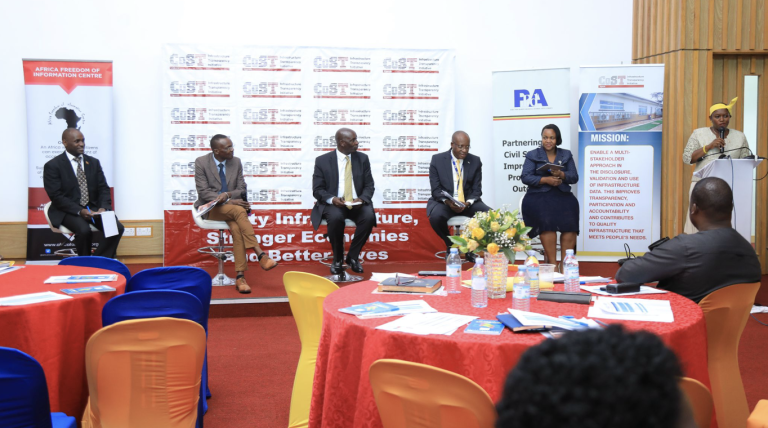
Civic Engagement
Social accountability and civic engagement ensures that information on public infrastructure projects is in the public domain. CoST works with stakeholders such as the media and civil society to promote the findings of the assurance process and ensure decision makers are held to account.
One of the main ways CoST Uganda has engaged with citizens has been by holding ‘barazas’.
Barazas are a Ugandan tradition in which different stakeholders come together for constructive dialogue to hold decision-makers to account. These have been instrumental in improving relations between local community and government and have improved infrastructure project delivery as a result. CoST Uganda’s first baraza was held in Wakiso District in 2017, where the findings of the first assurance report were discussed. In 2020, CoST Uganda held five community forums directly targeting citizens on infrastructure projects subject to assurance.
Speaking about the impact of barazas, Wakiso District Engineer, Samuel Mwesigwa, said: “The CoST barazas have been a turning point. They opened our minds to the relevance of involving citizens in infrastructure project delivery, from planning right through to completion and post-completion phases.”
CoST Uganda also conducts training for journalists, the private sector, and civil society. Throughout 2020, CoST Uganda brought together journalists from 45 media outlets to build understanding and interest in the more technical aspects of the infrastructure sector, as part of Promoting Fair Business Practices in Uganda. As a result, the ‘media team’ has grown to 57 committed journalists who published over 50 articles relating to Uganda’s infrastructure sector in 2020.
Get in touch
uganda@infrastructuretransparency.org
Useful links
- CoST Uganda website https://www.cost.or.ug/
- Information platform (GPP) https://gpp.ppda.go.ug/public/open-data/oc4ids/project-summary
- Annual workplan 2025 https://infrastructuretransparency.org/wp-content/uploads/2025/04/Uganda-annual-workplan-2025.pdf
